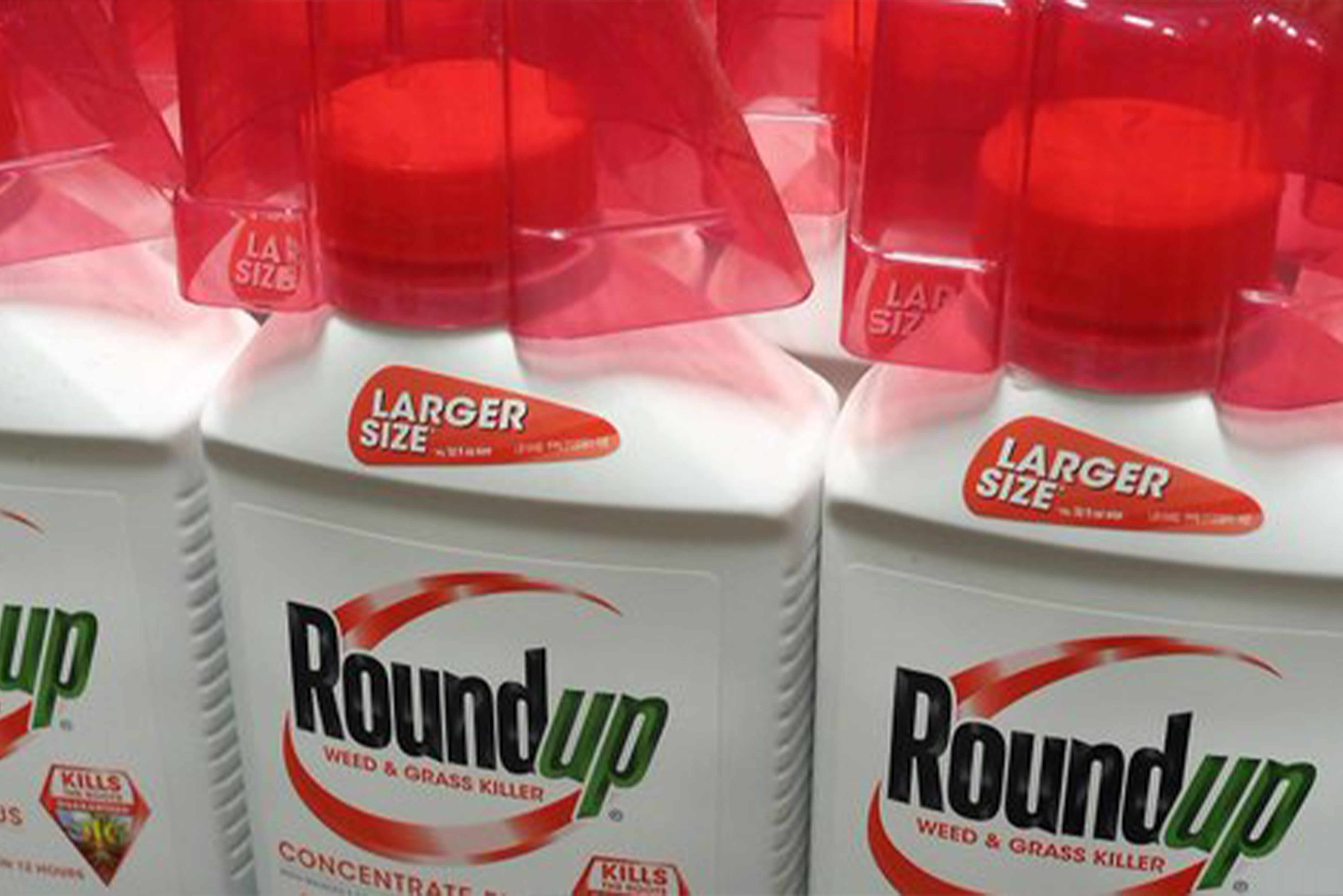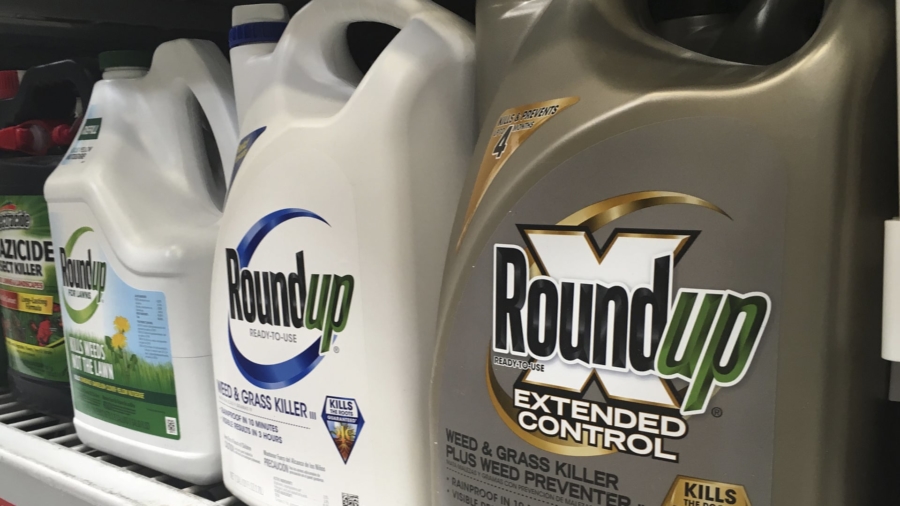Exposure to the chemical glyphosate, contained in Roundup has been linked to cancer or other serious illnesses.
RoundUp® Weed Killer
The product Roundup® is a broad spectrum herbicide that contains an isopropylamine salt of glyphosate as its active ingredient. In 1974, this product was first sold to farmers for commercial use. Since the late 1970s, the use of this herbicide has grown over 100 fold. This was especially true after Monsanto (the original developer) released Roundup® Ready Crops. These crops were resistant to Roundup® and allowed farmers to grow their crops without the fear of damage by blanket application of Roundup® for the control weeds in their fields.
Many researchers also believe that this increase in use was due to the widespread emergence of glyphosate-resistant weeds. By the year 2007, Roundup was the leading product used in commercial agriculture and the second-most popular for home, gardens, schools, government properties, industrial sites, and other commercial applications.
Interestingly, Roundup® was developed to replace other herbicides that were causing well-documented problems. The problems included damage to crops, decreased efficacy of the products, and risks to human health. It was initially tested for industry standards including toxicity. Early reports found that glyphosate-based herbicides (GBHs) posed a relatively low threat to non-target species, including mammals. Because of this, leading worldwide regulatory agencies set high acceptable exposure limits.
Glyphosate Exposure
The current U.S. Environmental Protection Agency (EPA) Acceptable Daily Intake (defined as the Chronic Reference Dose) is 2.0 mg of glyphosate per kilogram body weight per day (mg/kg/day). In contrast, the current European Union (28 countries) Acceptable Daily Intake is more than 5 times lower at 0.3 mg/kg/day (a level adopted in 2002). The data upon which these exposure thresholds are based was supplied by the manufacturers during the registration process (in 1986) and are considered proprietary. These reports are typically not available for any type of independent review.
Concerns about the carcinogenic properties of glyphosate-based herbicides increased after the World Health Organization’s International Agency for Research on Cancer (IARC) re-classified glyphosate as “probably carcinogenic to humans” in 2015. This decision was based on epidemiological studies that looked at occupational exposure and rodent studies which showed an association between glyphosate and renal tubule carcinoma, hemangiosarcoma, pancreatic islet cell adenoma, and/or skin tumors.
The IARC evaluation was based on the systematic selection and review of all publicly available and pertinent studies. The review of this information was conducted by independent experts that were free of any vested interests. They followed strict scientific criteria that are recognized throughout the world.
To reach these conclusions that they drew from their research, the IARC reviewed approximately 1000 studies. Some of these studies evaluated people that were exposed through employment, such as farmers. Others were experimental research related to cancer and cancer-related effects.
On April 30, 2018, the EPA closed the 60-day comment period for their Draft Human Health and Ecological Risk Assessments for Glyphosate paper that was released December 18, 2017. At the closing of this comment period, they stated that the “EPA is now evaluating the comments received and will consider any potential risk management options for this herbicide”. To date, no additional information has been released.
Researchers from the University of Washington have evaluated existing studies to look at the risk factors of exposure to the glyphosate-based herbicides including Roundup®. Their study results were recently published in the journal Mutation Research/Reviews in Mutation Research on February 10, 2019. These scientists concluded that this exposure significantly increases the risk of non-Hodgkin lymphoma (NHL), a cancer of the immune system.
Lawsuits against Bayer
The first high-profile case that was filed against Monsanto in the U.S. District Courts, California Northern District, San Francisco. This case (Docket number 3:16-cv-01244) was filed by DeWayne Johnson a former school groundskeeper who was diagnosed with terminal non-Hodgkin lymphoma in 2014. As a groundskeeper for the school, he applied Roundup® 20 – 30 times per year. He also recalled two incidents in which he accidentally was soaked with the product.
The case was filed as a “Personal Injury-Product Liability” lawsuit and alleged that chronic exposure to the glyphosate-based herbicide Roundup® caused the cancer that the plaintiff was diagnosed with and that the manufacturer of the product (Monsanto) did not sufficiently warn consumers of this risk.
The case was filed in March 2016. After the evidence was presented to the court and jury with just three days of deliberation, in August 2018 the jury found in favor of Mr. Johnson. They found that the weed killer Roundup® was directly responsible for the non-Hodgkin lymphoma that Mr. Johnson was dying from. The jury awarded DeWayne Johnson $250 million in punitive damages and about $39 million in compensatory damages.
After the verdict, Monsanto issued a statement saying it stands by the studies that suggest Roundup® does not cause cancer. The Monsanto Vice president stated, “We will appeal this decision and continue to vigorously defend this product, which has a 40-year history of safe use and continues to be a vital, effective and safe tool for farmers and others”.
One month later, Monsanto filed an appeal for a new trial and in October 2018, a judge from the San Francisco Superior Court denied a request for a new trial by Bayer-Monsanto but reduced the total damages from $289 million to $78.5 million.
In June 2108, Bayer announced that their acquisition of Monsanto was complete. With this, they not only acquired all of the rights to the product Roundup® but also all of the lawsuits associated with this product. At the beginning of 2019, it was estimated that the number of lawsuits that had been filed against Bayer had exceeded 9000. In the wake of these lawsuits and to cut costs following the acquisition, this German drug giant has announced that they would sell some of their brands and cut 12,000 jobs worldwide.
References:
http://npic.orst.edu/factsheets/glyphogen.html
https://www3.epa.gov/pesticides/chem_search/reg_actions/reregistration/fs_PC-417300_1-Sep-93.pdf
https://www.thelancet.com/journals/lanonc/article/PIIS1470-2045(15)70134-8/fulltext
https://www.epa.gov/pesticides/epa-releases-draft-risk-assessments-glyphosate
https://www.cnn.com/2018/08/10/health/monsanto-johnson-trial-verdict/index.html
http://www.pharmtech.com/bayer-completes-monsanto-acquisition-63-billion-0

Tracy R Everhart, MSN, MS CAM
For more than 20 years I've had the opportunity to work in numerous rolls within the medical field, including the last 7 years as a professional medical writer. With an undergraduate degree in biology/microbiology, postgraduate education in allopathic and complementary alternative medicine, my education has afforded me career opportunities with direct patient care, medical research and clinical oversight of statewide projects to improve the health of patients of all ages. I have a broad and deep knowledge of illnesses and conditions that can affect the human body. Even more important is that I have learned traditional treatment methodologies combined with alternative forms, to make the most informed decision about options that may be available.

Get a Free Roundup Case Review
If you or a loved one have been diagnosed with non-Hodgkin’s lymphoma or another form of cancer after using Roundup, you may be eligible for a compensation.


